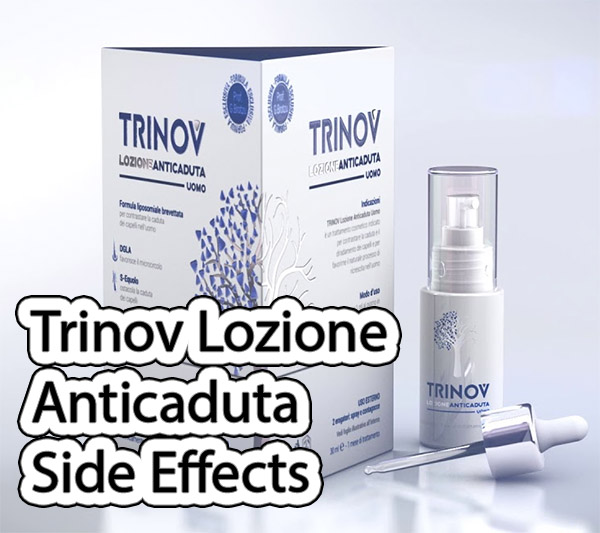
Introduction
Trinov Lozione Anticaduta, aka Brotzu lotion, is a new player in the market for hair-loss reversal agents. Boasting an exhaustive list of 13 ingredients, this recently released formulation has been studied in 2019 by Dr Giovanni Brotzu himself. Apart from its 3 core ingredients, Brotzu lotion also contains 10 ancillary ingredients which form solvents, emulsifiers, anti-foaming agents, moisturizers and antioxidants[1]. In this article, we will focus on the adverse effects in Dr Brotzu’s study which was published in 2019, as well as the reported side effects of the individual ingredients within Brotzu lotion. Read here if you want to have an overview of Trinov Lozione Anticaduta.
Brotzu Lotion Study
To date, only one study has been conducted to test the safety, performance and efficacy of Brotzu lotion. This study was conducted by Dr Giovanni Brotzu himself in 2019, over a period of 6 months. In this study, he recruited 30 men and 30 women with androgenetic alopecia, also known as “male pattern baldness”. During this study, no significant adverse effects were observed nor reported.
However, 1 out of the 30 women reported a “mild burning sensation” immediately after each application of the lotion for the entirety of the 6 month treatment duration. She also reported that this burning sensation resolved spontaneously within a few minutes.
There are a few criticisms of this study, in regard to its side effects. First of all, the study only recruited 60 men and women - a sample size that is far too small. Secondly, the study only followed patients for 6 months. Minimally, the study should have observed patients for 1 year as most patients with hair loss tend to use topical treatment solutions for at least 1 year. Thirdly, the study did not make mention of excluding patients with known skin allergies.
Since Brotzu lotion contains 3 core ingredients and 10 ancillary ingredients which range from moisturizers, to emulsifiers, to solvents and anti-foaming agents, patients who use Brotzu lotion may develop one of the following:
1. Allergic Reaction
2. Anaphylactoid Reaction
3. Anaphylaxis
The three outcomes described above are on a spectrum of allergy – common allergic reactions are usually not harmful, as they result in swelling, itching and reddening of the affected skin. However, anaphylactoid reactions and anaphylaxis can be fatal. Indeed, skin allergies can progress in certain individuals to affect the respiratory system (tightening of the upper airway and obstructed breathing), gastrointestinal system (profuse watery diarrhoea), cardiovascular system (decreased blood pressure and heart rate) as well as the mucous membranes (conjunctivitis). Hence, patients who have known drug or skin allergies should read the ingredients list of Brotzu Lotion extremely carefully and consult with their physicians before applying it.
Additionally, there are specific side effects associated with the ancillary ingredients of Brotzu lotion. For example, denatured alcohol (used as a solvent in Brotzu lotion) is strongly associated with drying, itching and scaling of skin[2]. Stearamine (used as an anti-foaming agent in Brotzu lotion) is associated with mild skin irritation [3]. Ethylhexyglycerin (used as a preservative in Brotzu lotion) is associated with allergic dermatitis and in fact has been discovered to be a “sensitizer” to cosmetics. In other words, Ethylhexyglycerin increases the odds of one mounting an allergic reaction to other compounds in a cosmetic product [4,5]. For a complete list of ingredients, please refer to the “Ingredients of Brotzu Lotion” article in this series!
Furthermore, since Brotzu lotion inhibits DHT and 5α-reductase, Brotzu lotion may even cause the following side-effects[6,7]:
1. Decreased libido
2. Decreased volume of ejaculate
3. Erectile Dysfunction
4. Gynecomastia
5. Major Depressive Disorder
6. Generalized Anxiety Disorder
7. Insomnia
The reason for these side-effects is because DHT and 5α-reductase are inhibited by Brotzu lotion. The testicles produce testosterone which is converted to DHT by 5α-reductase. By inhibiting DHT and 5α-reductase, Brotzu lotion may reduce the overall testosterone and lead to these side-effects by means of “chemical castration”.
References
Brotzu, G., et al., A liposome-based formulation containing Equol, dihomo-gamma-linolenic acid and propionyl-l-carnitine to prevent and treat hair loss: A prospective investigation. Dermatol Ther, 2019. 32(1): p. e12778.
Final report of the safety assessment of Alcohol Denat., including SD Alcohol 3-A, SD Alcohol 30, SD Alcohol 39, SD Alcohol 39-B, SD Alcohol 39-C, SD Alcohol 40, SD Alcohol 40-B, and SD Alcohol 40-C, and the denaturants, Quassin, Brucine Sulfate/Brucine, and Denatonium Benzoate. Int J Toxicol, 2008. 27 Suppl 1: p. 1-43.
Lanigan, R.S., Final report on the safety assessment of Stearamide DIBA-Stearate. Int J Toxicol, 2001. 20 Suppl 3: p. 91-7.
Mortz, C.G., A. Otkjaer, and K.E. Andersen, Allergic contact dermatitis to ethylhexylglycerin and pentylene glycol. Contact Dermatitis, 2009. 61(3): p. 180.
Aerts, O., L. Verhulst, and A. Goossens, Ethylhexylglycerin: a low-risk, but highly relevant, sensitizer in 'hypo-allergenic' cosmetics. Contact Dermatitis, 2016. 74(5): p. 281-8.
Trinov Lozione Anticaduta Results
Minoxidil Shampoo | Why is it a bad idea?